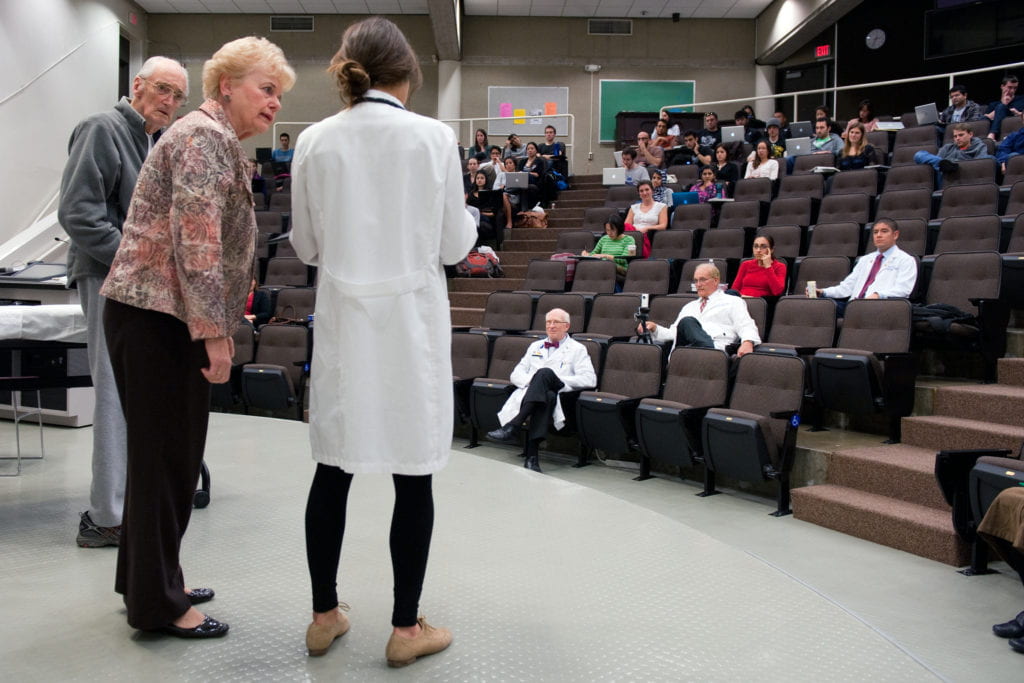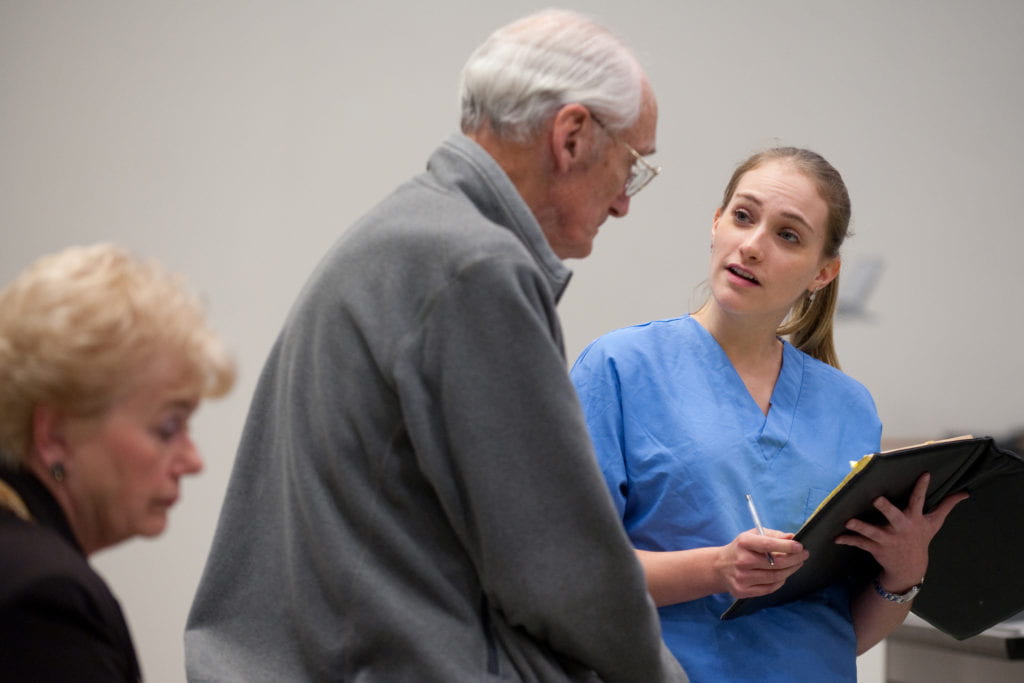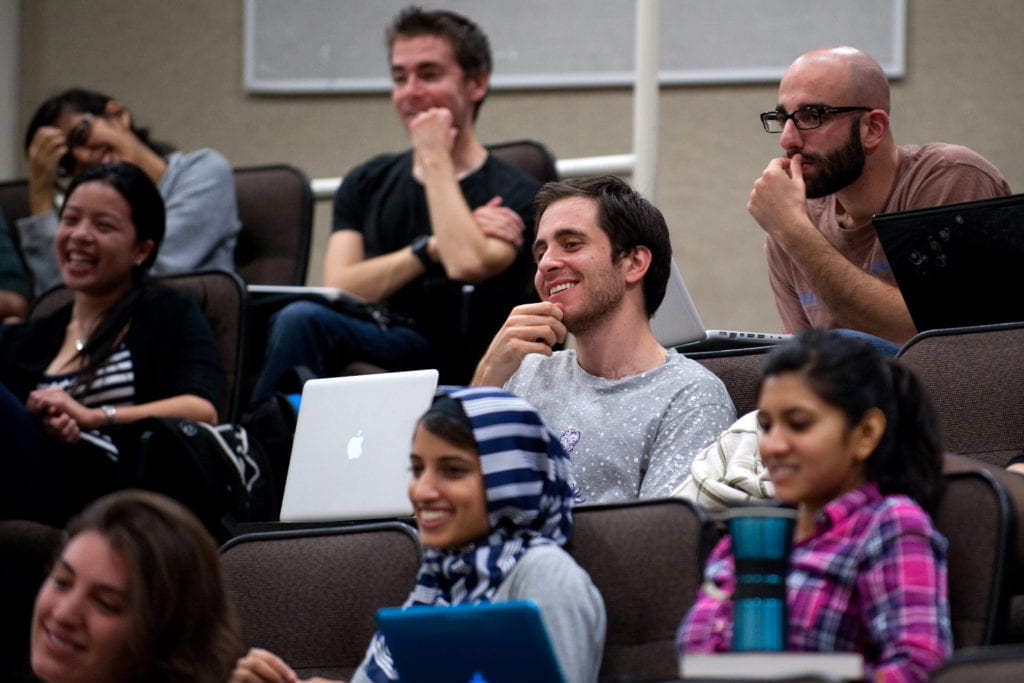Acting out ageism
The UC Irvine Program in Geriatrics has instituted an innovative live theater performance that highlights the dos and don’ts of patient care for older adults.
If all the world’s a stage, there’s no greater drama than the interaction between doctor and patient. To ensure that this plays out well, the UC Irvine Program in Geriatrics has instituted an innovative live theater performance that highlights the dos and don’ts of patient care for older adults.
Dr. Lisa Gibbs, a geriatrician at UCI’s SeniorHealth Center, first learned about the production while collaborating with the Weill Cornell Medical College in New York City to develop more humanities-based medical school programs, as part of a Donald W. Reynolds Foundation grant effort. Cornell geriatrician Dr. Veronica LoFaso wrote the play — based on a real case — and Gibbs partnered with Chapman University theater professor Tamiko Washington to stage it in UCI’s Tamkin Student Lecture Building auditorium.
The show debuted in mid-December as part of “Clinical Foundations,” a core course that teaches history taking and physical examination skills. Gibbs says the play will become a permanent part of the curriculum.
“This project is fascinating to me,” says Washington, who is also artistic director of OC-centric. “I learned a great deal about how elderly patients are treated in the medical profession and in society, and the production really promotes the importance of communication and caring.”
She recruited professional and student actors to fill roles. The first act takes place in an emergency room, where Mrs. Olson (Judy Jones) brings her octogenarian father, Mr. Forman (Stu Erickson), who complains of chest pains. Ageist behavior is displayed by the attending nurse and physician: They speak loudly at Mr. Forman, converse mainly with his daughter, refuse to listen to the old man and generally dismiss him as feeble and confused. It’s assumed he’s had a heart attack, but a battery of tests reveals nothing. Mr. Forman finally leaves hours later with a referral to see Dr. Kramer (Ken Dalena), a geriatrician.
Act 2 occurs in Dr. Kramer’s office, where Mr. Forman is treated with compassion and dignity. The physician talks directly with Mr. Forman – his daughter has been asked to leave the room – to learn more about the underlying factors that may have contributed to the chest pains. He learns that Mr. Forman was recently widowed; instead of a heart attack, he suffers from a broken heart.
As the drama unfolded, the dozens of students in the large auditorium sat in rapt attention. Afterward, Johanna Shapiro, director of UCI’s humanities-in-medicine program, grouped the actors and UCI geriatricians onstage to field questions from the audience. The frank conversation lasted nearly an hour, much to Gibbs’ delight.
“I think it went extremely well,” says the associate professor of family medicine. “It demonstrated the power of live performance. The students were engaged. It was a very honest portrayal of many patient-doctor interactions. We hope the students learn that how they communicate with patients can determine the outcome.”
The play, Gibbs adds, is just one aspect of the Student-Senior Partner Program, in which small groups of first- and second-year medical students are paired with SeniorHealth Center patients to discuss healthcare and lifestyle issues. In addition, the students visit their seniors at home and accompany them on trips to the doctor. Afterward, they’re encouraged to produce a creative piece — a poem, story or painting, for instance — reflecting their experience.
It’s all part of the UCI School of Medicine’s effort to incorporate the arts and humanities into medical training, Gibbs notes.
“We’re fortunate that the leadership here is willing to try innovative approaches to medical education,” she says. “We believe that integrating elements of theater and the humanities into the process is a captivating approach to teaching geriatrics, because it emphasizes each lesson in a very human way.”


